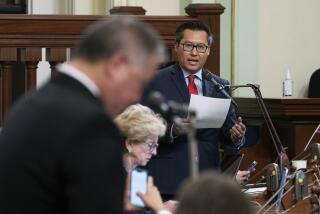Lungren’s Legal Tangle
- Share via
It is deceptively simple to state the issues at stake in the long-running dispute over whether Rep. Daniel E. Lungren (R-Long Beach) is entitled to be sworn in as state treasurer: For confirmation, does the state Constitution require that both houses of the Legislature vote to approve such an appointment? For a nominee to be rejected, must both houses reject him?
What’s hard is untangling the snarled history and intent of the 1976 constitutional amendment that governs this bitterly partisan and ugly dispute. On one side we have Lungren and Gov. George Deukmejian, allies in spirit though nominal adversaries in the friendly lawsuit that Lungren has filed in the California Supreme Court to claim the job to which the governor nominated him; they contend that the “plain meaning” of the constitutional provision entitles Lungren to the treasurer’s seat because only the state Senate rejected him. On the other side are Atty. Gen. John K. Van de Kamp and Senate President David A. Roberti, who read the Constitution to mean that a nominee must be confirmed by a majority of both houses.
Actually, nothing is plain from the two sentences that were proposed by the Legislature and ratified by the voters as Proposition 9 in the November, 1976, general election. The first sentence says that the governor’s nominee to fill a vacancy “shall take office upon confirmation by a majority of the membership of the Senate and a majority of the membership of the Assembly.” The second sentence, irreconcilable at first glance, says that “in the event the nominee is neither confirmed nor refused confirmation by both the Senate and the Assembly within 90 days . . . the nominee shall take office.” So murky is all this that the litigants have been reduced to debating the significance of specific words like and and both .
From the amendment’s history, the Democrats’ position seems more compelling, bolstered as it is by the official explanation in the voters’ pamphlet for the 1976 election. There, the voters were told forthrightly, by then-Atty. Gen. Evelle J. Younger and by the measure’s sponsors, that confirmation by “the Legislature”--meaning both houses--would be required; the second sentence meant only that an appointee could take office within 90 days “if (the) Legislature does not act,” Younger said.
Further support for the Democrats’ interpretation comes from one of the measure’s original opponents, then-Assemblyman Mike D. Antonovich. He argued for its defeat because, he said, requiring two-house confirmation would leave the nomination process “subject to the whims of either the Senate or Assembly.”
No matter who is right, the California Supreme Court should accept Lungren’s lawsuit as part of its original jurisdiction and expedite a decision. Treasurer Jesse M. Unruh died almost eight months ago, and the process of replacing him has been prolonged by blatant partisanship--by the governor, who insisted on a candidate unpalatable to the Democrats; by the protracted hearings that the Democrats demanded, and now by a lawsuit filed by a would-be treasurer so unsure of the suit’s outcome that he hasn’t yet given up his seat in the U.S. Congress. Van de Kamp, seizing on Lungren’s refusal to resign from Congress, contends that he technically cannot even assert a right to the treasurer’s post because he already has a job. It’s hard to avoid the conclusion that the attorney general, like everyone else, is playing politics--and that no interest would be served in delaying a Supreme Court decision.
More to Read
Get the L.A. Times Politics newsletter
Deeply reported insights into legislation, politics and policy from Sacramento, Washington and beyond. In your inbox twice per week.
You may occasionally receive promotional content from the Los Angeles Times.










